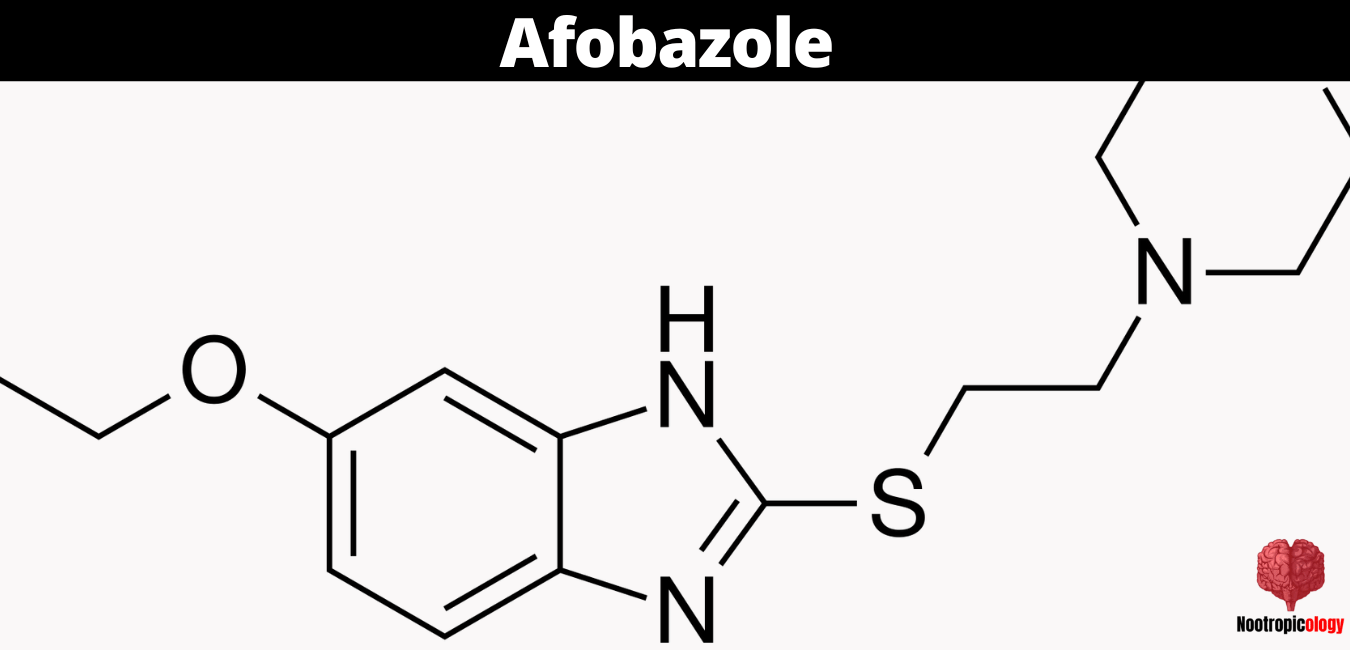
I've always been intrigued by the complex world of nootropics and their potential to enhance cognitive function.
Recently, my attention has been drawn to Afobazole, a lesser-known but promising nootropic agent with anxiolytic and neuroprotective properties.
Today, I will delve into the science behind Afobazole and explore its significance in the realm of cognitive enhancement and anxiety relief.
So without further ado, let's dive in, shall we?
Significance of Afobazole as a Nootropic Agent

Afobazole, known as Fabomotizole, C15H22ClN3O2S, and Obenoxazine, is a selective anxiolytic compound that has garnered considerable attention in the field of neuroscience and psychopharmacology due to its distinctive mechanism of action and potential cognitive benefits.
Originally developed in Russia in the early 2000s, Afobazole is touted as a powerful nootropic agent due to its ability to modulate certain neurotransmitters involved in cognitive processes such as focus, attention, and memory.
As a dihydroimidazo-benzodiazepine derivative, Afobazole's unique chemical structure sets it apart from conventional benzodiazepines and other anxiolytic medications. Afobazole's distinct pharmacodynamic profile includes agonism at the sigma-1 receptor (σ1R), modulation of the MT1 melatonin receptor, and indirect influence on the gamma-aminobutyric acid (GABA) system.[1]
This multifaceted mechanism of action contributes to its anxiolytic and nootropic properties while minimizing the undesirable side effects commonly associated with other anxiolytic drugs.
In contrast to benzodiazepines and other classical anxiolytics, which often cause sedation, cognitive impairment, and dependence, Afobazole demonstrates a favorable safety and tolerability profile. The absence of sedation, cognitive impairment, and withdrawal symptoms renders Afobazole a particularly attractive option for individuals seeking cognitive enhancement and anxiety relief (but more on this later).
Preclinical and clinical studies have indicated that Afobazole exerts neuroprotective effects, providing additional benefits in the context of stress-related neurological disorders and cognitive decline.
Given the increasing prevalence of anxiety disorders and the growing interest in nootropics, Afobazole's unique combination of anxiolytic and cognitive-enhancing properties warrants further investigation and development to exploit its therapeutic potential fully.
Afobazole's Chemical Composition and Mechanism of Action
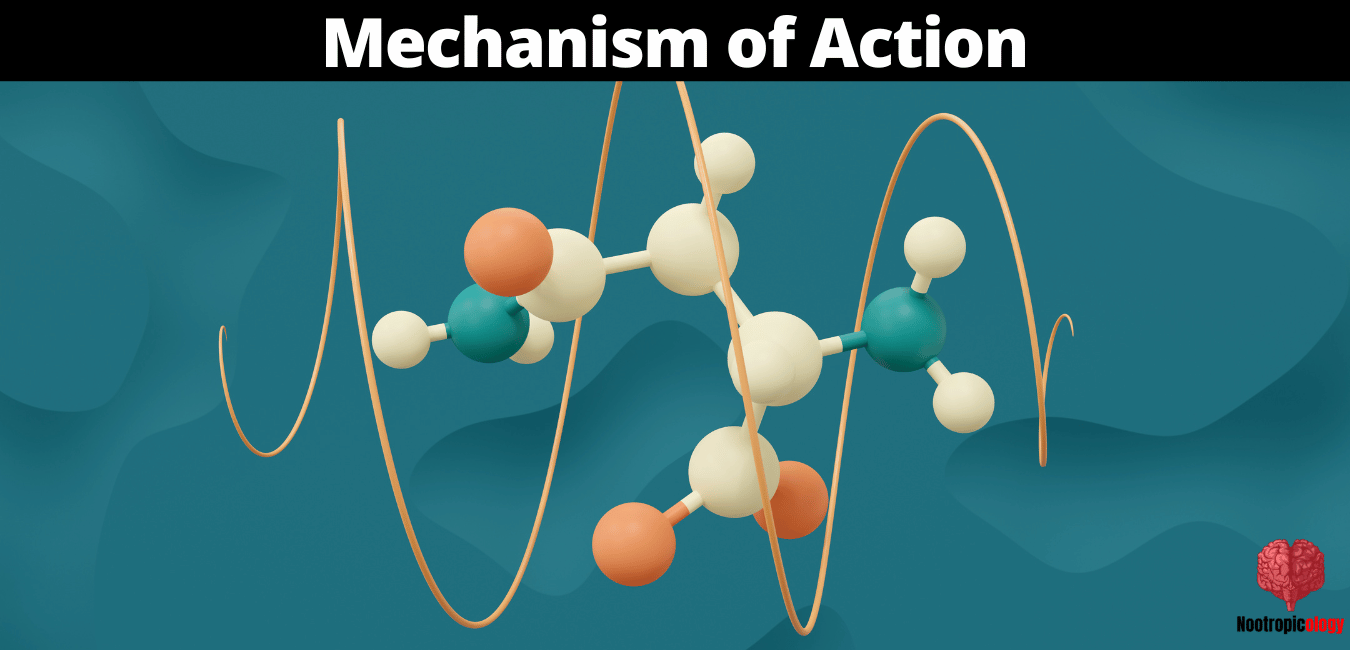
Afobazole, chemically identified as 4-[2-[(6-ethoxy-1H-benzimidazol-2-yl)sulfanyl]ethyl]morpholine;dihydrochloride, is a dihydroimidazobenzodiazepine derivative.[2]
This structural distinction from classical benzodiazepines, such as diazepam and alprazolam, results in a unique molecular architecture that underlies its distinct pharmacological properties and differentiates it from other anxiolytic medications.
Pharmacodynamics: Molecular Targets and Cellular Mechanisms
Let's look at the molecular targets and cellular mechanisms behind Afobazole's pharmacological profile below.
Sigma-1 Receptor Agonism
Afobazole displays a high affinity for sigma-1 receptors (σ1Rs), which are chaperone proteins involved in modulating a wide array of cellular functions, such as ion channel activity, cellular differentiation, and neurotransmitter release.
This agonism at the σ1R plays a crucial role in Afobazole's anxiolytic and cognitive-enhancing effects, as it influences neuronal plasticity and stress resilience.
MT1 Melatonin Receptor Interaction
In addition to σ1R agonism, Afobazole interacts with the MT1 melatonin receptor, a G protein-coupled receptor (GPCR) integral to regulating circadian rhythms and sleep-wake cycles.[3]
By modulating the MT1 receptor, Afobazole may enhance cognitive performance, especially in tasks that require sustained attention and vigilance, as it optimizes sleep quality and mitigates sleep disturbances.
GABAergic System Modulation
Although Afobazole does not directly bind to GABA-A receptors like traditional benzodiazepines, it still modulates the GABAergic system. This modulation is achieved through the allosteric regulation of GABA-A receptors, which enhances inhibitory neurotransmission.[4]
This action is believed to contribute to Afobazole's anxiolytic effects and potentially mitigate stress-induced cognitive deficits.
Serotonergic System Modulation
Afobazole has also been reported to modulate the serotonergic system by increasing the availability of serotonin (5-HT) in the synaptic cleft. This action could further contribute to its anxiolytic effects by regulating mood and emotional responses and improving cognitive function by optimizing neurotransmitter balance.[5]
These diverse molecular targets and cellular mechanisms underpin the unique pharmacological profile of Afobazole, setting it apart from classical benzodiazepines and other anxiolytic medications in terms of its potential cognitive-enhancing and anxiolytic effects.
Pharmacokinetics: Absorption, Distribution, Metabolism, and Excretion (ADME)
Afobazole exhibits favorable pharmacokinetic properties, with rapid oral absorption and high bioavailability (43.64%, pronounced first-pass effect), ensuring efficient systemic distribution. The drug undergoes extensive first-pass hepatic metabolism via cytochrome P450 (CYP) enzymes, primarily CYP3A4, generating active metabolites contributing to its pharmacological effects.[6]
Afobazole and its metabolites are primarily eliminated through renal excretion, with a half-life (T1/2) of approximately 0.82±0.54 hours.
Cognitive Enhancement Benefits of Afobazole (Fabomotizole)
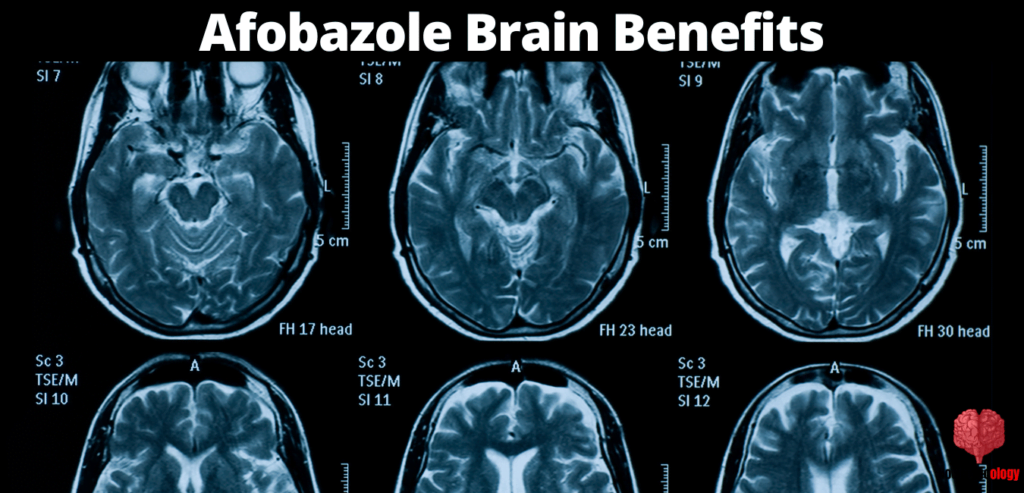
Now that we know a little bit more about Afobazole let's take a look at the cognitive enhancement benefits it can offer.
- Role in Synaptic Plasticity and Long-Term Potentiation: It has been shown to promote synaptic plasticity and long-term potentiation (LTP), which are essential for learning and memory formation. This effect is primarily attributed to its glutamatergic and cholinergic neurotransmitter systems modulation.[7]
- Effect on Neurotransmitter Systems (Cholinergic, Glutamatergic): Afobazole's influence on cholinergic and glutamatergic systems further contributes to its memory-enhancing effects by increasing the availability of acetylcholine (ACh) and glutamate, two key neurotransmitters involved in cognitive processes.[8]
- Modulation of Prefrontal Cortex Activity: It has been demonstrated to modulate prefrontal cortex activity, which is crucial for executive function, decision-making, and attention.
- Influence on Dopaminergic and Noradrenergic Systems: The drug's interaction with dopaminergic and noradrenergic systems may also improve attention and executive function by modulating arousal and motivation.[9]
- Impact on the Hypothalamic-Pituitary-Adrenal (HPA) Axis: Afobazole's ability to modulate the HPA axis, which is the central stress response system, contributes to its anxiolytic effects. By normalizing the release of stress hormones such as cortisol, Afobazole helps reduce anxiety symptoms.[10]
- Interaction with Serotonergic and Neuropeptide Systems: It also interacts with serotonergic and neuropeptide systems, further contributing to its anxiolytic properties by regulating mood and emotional responses.
- Attenuation of Oxidative Stress and Inflammation: Afobazole has been shown to reduce oxidative stress and inflammation, which are common consequences of chronic stress and can impair cognitive function. This effect contributes to its neuroprotective and cognitive-enhancing properties.
- Boosts BDNF: Studies have also shown that Afobazole increases the production of Brain-Derived Neurotrophic Factor (BDNF), a hormone involved in neuroplasticity and neural repair. This helps to improve memory formation, recall, mood, and learning ability.[11].
Clinical Studies and Efficacy of Afobazole (Trial Designs and Methodologies)
Numerous clinical trials have been conducted to evaluate the safety and efficacy of Afobazole in treating anxiety disorders and improving cognitive function.
These studies employed various methodologies, including randomized controlled trials (RCTs), open-label studies, and comparative trials with other anxiolytics and cognitive enhancers.
Let's look at the most interesting clinical studies related to Afobazole below.
A Multicenter Randomized Clinical Research Phase III Study Trial
A study by Syunyakov and Neznamov aimed to summarize the results of a multicenter randomized clinical research phase III trial that compared the therapeutic efficacy and safety of afobazole (INN: fabomotizole) with diazepam in treating patients with Generalized Anxiety Disorder (GAD) and Adjustment Disorders (AD).[12]
The trial involved 150 patients aged 18 to 60 years, with 60 patients diagnosed with GAD and 90 with AD. These patients had simple structures of anxiety disorders without concurrent mental, neurological, or somatic disorders.
The participants were randomized to receive either afobazole (30 mg/day; n=100) or diazepam (30 mg/day; n=50) for 30 days. The primary efficacy endpoint was the change in the Hamilton Anxiety Rating Scale (HAMA) total score.
Secondary efficacy endpoints were the Clinical Global Impression (CGI) Scale and Sheehan Scale scores. Drug safety was evaluated by assessing adverse events.
Both afobazole and diazepam showed a significant reduction in HAMA total scores. However, the reduction of anxiety in the afobazole group exceeded that of the diazepam group. Additionally, a higher proportion of patients in the afobazole group experienced a reduction in disease severity compared to the diazepam group.
After therapy completion, the proportion of patients with no or mild disorder in the afobazole group was significantly higher than in the diazepam group.
Moreover, there was a trend toward a higher subjective patient-rated estimate of the afobazole effect using the Sheehan scale. Adverse events were considerably lower in the afobazole group compared to the diazepam group. No manifestations of afobazole withdrawal syndrome were found, while diazepam withdrawal syndrome was observed in 34 (68%) patients.
In conclusion, the study demonstrated that afobazole is an effective and safe drug for treating patients with GAD and AD. It is non-inferior to diazepam in treating these disorders but has superior results regarding several variables, including its safety profile.
Cardioprotective Action of σ1 Receptor Agonist Anxiolytic Fabomotizole Hydrochloride (Afobazole)
A study by Kryzhanovskii et al. investigated the cardioprotective action of anxiolytic Afobazole using an original translational rat model of chronic heart failure provoked by experimental anterior transmural myocardium infarction.[13]
The preventive action of Afobazole (15 mg/kg/day administered intraperitoneally during the first 15 days after coronary occlusion) on the development of heart failure was assessed 3 months after infarction.
The study found that Afobazole prevented the development of pathological remodeling of the myocardium, maintained its inotropic function, and decreased the plasma level of brain natriuretic peptide, a known biochemical marker of chronic heart disease failure.
In the myocardium, Afobazole down-regulated the overexpression of genes induced in chronic heart failure and assessed by corresponding RNA levels. These genes code for angiotensin (AT1A-R), vasopressin (V1A-R), and glucocorticoid (GR) receptors, as well as Epac2 protein.
The observed biochemical changes align with the data on the cardioprotective action of Afobazole, indicating its potential benefits for heart health alongside its anxiolytic properties.
Safety, Side Effects, and Tolerability Profile of Afobazole
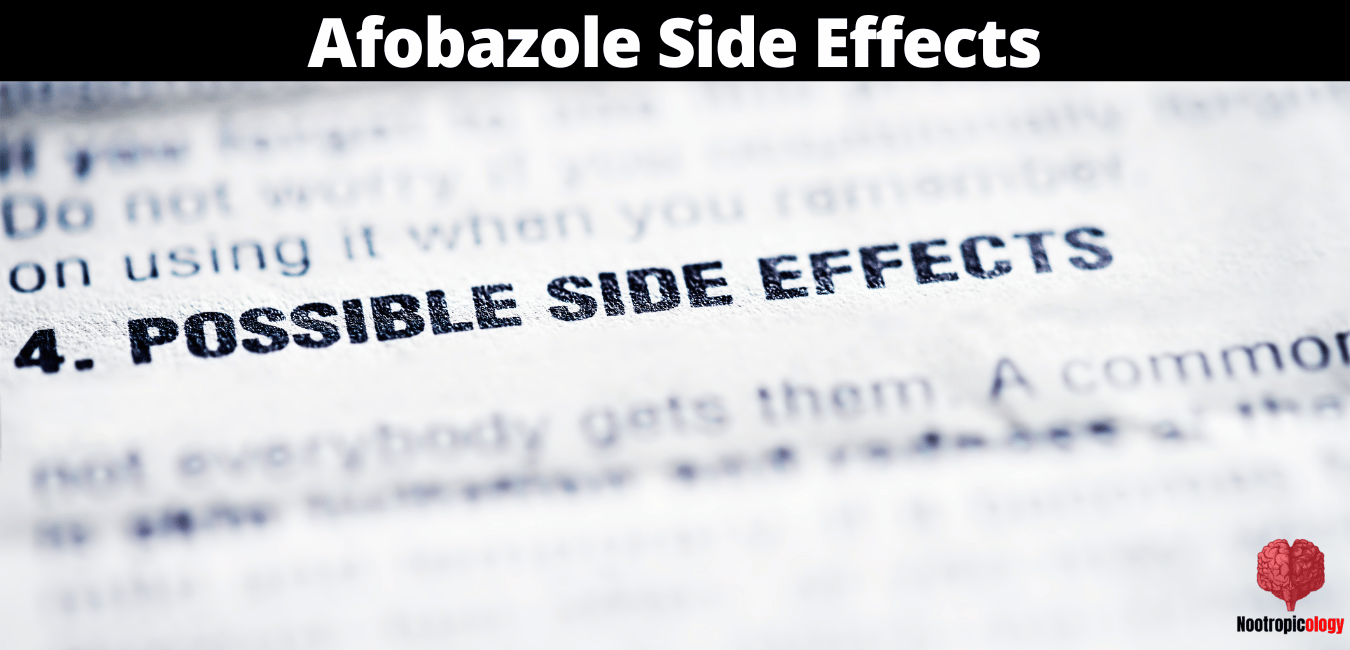
The following sections provide an in-depth analysis of the safety, side effects, and tolerability profile of Afobazole.
I will discuss the adverse effects and contraindications associated with Afobazole use, potential drug-drug interactions, and precautions to consider when incorporating it into your nootropic stack.
Adverse Effects and Contraindications
Afobazole has been found to be generally well-tolerated, with a limited number of reported side effects. Its administration's most common adverse effects include mild gastrointestinal symptoms, such as nausea, abdominal discomfort, and diarrhea.
Additionally, some patients may experience dizziness or headache following Afobazole use. These adverse effects are typically mild and transient, rarely necessitating discontinuation of treatment.
Contraindications for Afobazole use primarily involve hypersensitivity to the drug or any of its components. Patients with a known history of allergic reactions to Afobazole or related compounds should avoid its use.
Furthermore, individuals with severe hepatic or renal impairment should exercise caution, as the drug undergoes extensive hepatic metabolism and is primarily eliminated via the renal route. In such cases, alternative treatments or dosage adjustments may be necessary to ensure patient safety.
Drug-Drug Interactions and Precautions
Afobazole has a relatively low potential for drug-drug interactions, making it a favorable option for patients who may be taking multiple medications.
However, caution should be exercised when combining Afobazole with other medications that affect the central nervous system (CNS), such as sedatives, antipsychotics, or antidepressants, as the combined effects on the CNS may result in additive or synergistic interactions that could potentially exacerbate side effects or impact treatment efficacy.
Since Afobazole is metabolized by specific liver enzymes, there may be potential interactions with other medications that are also metabolized by the same enzymes, particularly those that are strong inhibitors or inducers of these enzymes.
In such cases, dose adjustments or close monitoring may be necessary to prevent potential adverse effects or decreased drug efficacy.
That said, Afobazole's safety, side effects, and tolerability profile make it an attractive nootropic for individuals seeking anxiolytic and cognitive-enhancing benefits.
Comparing Afobazole With Other Nootropic Agents
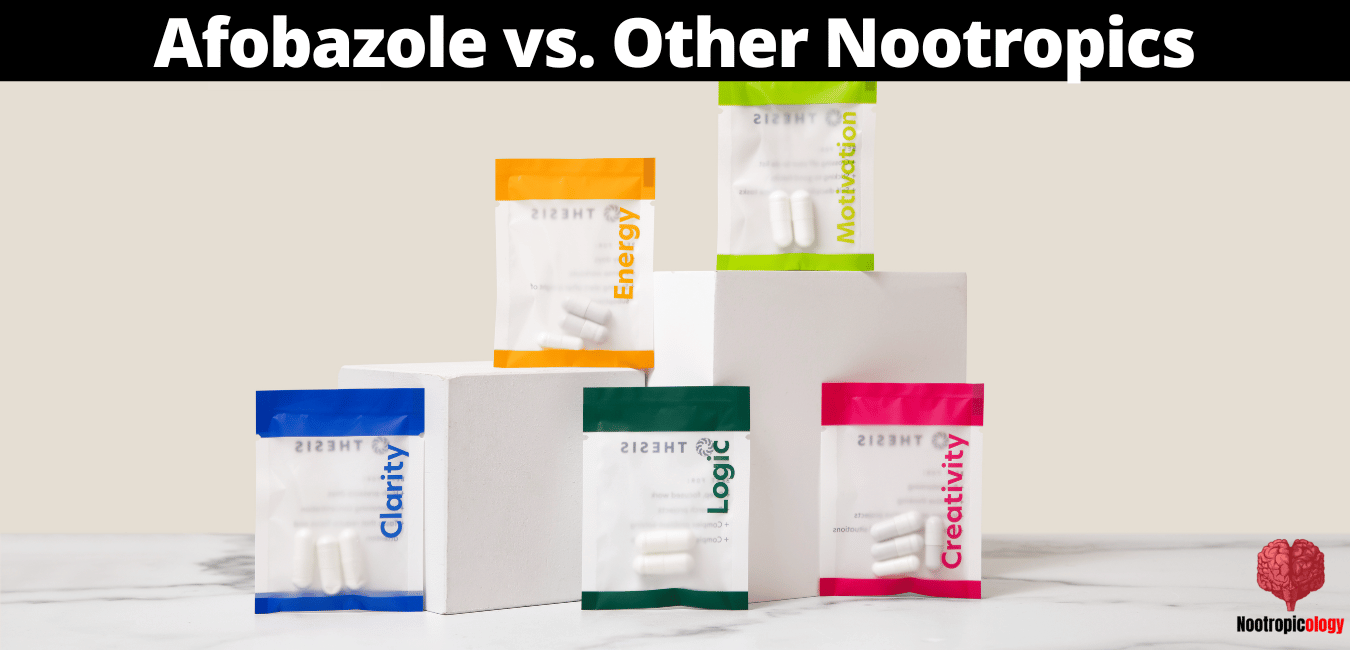
Afobazole offers several advantages over other anxiolytics and cognitive enhancers, such as a lack of sedation, cognitive impairment, and withdrawal symptoms typically associated with benzodiazepines.
Its unique mechanism of action sets it apart from other nootropic compounds in the field. However, the clinical use of Afobazole is currently limited due to factors such as relatively low availability and limited awareness among healthcare professionals.
Let's compare the efficacy of Afobazole with other anxiolytics and cognitive enhancers on the market below:
Afobazole vs. Benzodiazepines
Compared to benzodiazepines, Afobazole demonstrates similar anxiolytic efficacy without the associated cognitive impairment and risk of dependence.
This unique profile makes it an attractive alternative for individuals seeking anxiety relief without the potential drawbacks of benzodiazepine use.
Afobazole vs. Selective Serotonin Reuptake Inhibitors (SSRIs)
Afobazole's anxiolytic effects are comparable to those of SSRIs, but it may offer additional cognitive enhancement benefits.
As a result, Afobazole could be a more suitable option for individuals who require both anxiolytic and cognitive-enhancing properties from their medication.
Afobazole vs. Racetams
While racetams are primarily known for their cognitive-enhancing effects, Afobazole provides the added advantage of anxiolytic properties.
This dual action may be particularly beneficial for individuals with anxiety-related cognitive deficits, offering a more comprehensive approach to treatment.
Afobazole vs. Modafinil (Provigil)
Afobazole differs from modafinil in its mechanism of action and primary therapeutic indications. While modafinil is primarily used for promoting wakefulness and enhancing attention, Afobazole offers a combination of cognitive enhancement and anxiety relief. This versatility makes it a more suitable option for individuals seeking both cognitive and emotional benefits.
Afobazole vs. Phenibut (Anvifen)
Phenibut is a central nervous system depressant with anxiolytic and nootropic effects. While both Afobazole and Phenibut provide anxiolytic benefits, Afobazole is generally considered safer due to its lack of sedation and lower risk of dependence.
Phenibut, on the other hand, can lead to tolerance, withdrawal symptoms, and potential abuse. Therefore, Afobazole may be a more appropriate choice for long-term use in individuals seeking anxiety relief and cognitive enhancement.
Frequently Asked Questions (FAQ)
Let's take a look at some of the most common questions surrounding Afobazole and its use.
Where Can I Buy Afobazole (Fabomotizole) Online?
The availability of Afobazole (Fabomotizole) varies depending on your location. It is primarily marketed in Russia and some Eastern European countries. You can purchase it through online pharmacies or suppliers specializing in nootropics. I recommend buying Afobazole online from Science.bio.
How Does Afobazole (Fabomotizole) Make You Feel?
Afobazole (Fabomotizole) is an anxiolytic and nootropic agent that primarily helps alleviate anxiety and stress-related symptoms. Users experience a sense of calm, relaxation, and emotional stability without sedation or cognitive impairment often associated with other anxiolytics like benzodiazepines. Additionally, most individuals notice improvements in cognitive functions such as memory, attention, and executive function.
What Is Afobazole's (Fabomotizole) Half-life?
The elimination half-life of Afobazole is reported to be 0.82±0.54 hours. This indicates that it takes about 0.82 hours, with some variation, for the concentration of the drug in the body to decrease by half.
How Long Does It Take for Afobazole (Fabomotizole) to Work?
Afobazole (Fabomotizole) has an onset of action of approximately 0.85±0.13 hours. This means it takes around 0.85 hours, with some variation, for the drug to start taking effect. In other words, Afobazole begins to work relatively quickly, typically within about 45-60 minutes after administration.
What Is The Optimal Afobazole (Fabomotizole) Dosage?
Afobazole (Fabomotizole) is available in 10 mg tablets and should be taken orally with water after a meal. The optimal dosage is typically 10 mg, taken three times daily for a treatment course of 2-4 weeks. If needed, the daily dosage can be increased to 60 mg and the treatment duration may be extended up to 3 months, based on a doctor's recommendation.
Can You Stack Afobazole (Fabomotizole) With Other Nootropics?
Stacking Afobazole (Fabomotizole) with other nootropics like Aniracetam and a choline source can offer synergistic effects by complementing each other's mechanisms of action in the brain. A choline source is often included in nootropic stacks because it supports the synthesis of acetylcholine (ACh), a neurotransmitter essential for cognitive functions like memory, learning, and attention. By providing the necessary building blocks, a choline source can help enhance the effects of other nootropics and promote optimal cognitive performance.
Conclusion
Afobazole represents a promising nootropic and anxiolytic agent with a unique mechanism of action and a favorable safety profile. Its ability to improve memory, attention, and executive function, as well as reduce anxiety symptoms and promote neuroprotection, sets it apart from other commonly used cognitive enhancers and anxiolytics.
Further investigation into Afobazole's pharmacological properties and long-term effects is warranted to understand its therapeutic potential better and optimize its clinical use. Additionally, increased awareness and availability of Afobazole among healthcare professionals could contribute to its broader adoption as a safe and effective option for cognitive enhancement and anxiety relief.
Overall, Afobazole is a valuable addition to the growing list of nootropics and anxiolytics. Continued research and development efforts are essential to fully harness its potential and bring its benefits to a wider population in need of cognitive enhancement and anxiety relief.
- Voronin, Mikhail V et al. “Involvement of Chaperone Sigma1R in the Anxiolytic Effect of Fabomotizole.” International journal of molecular sciences vol. 22,11 5455. 21 May. 2021, doi:10.3390/ijms22115455
- National Center for Biotechnology Information. "PubChem Compound Summary for CID 9862936, "Afobazol" PubChem, https://pubchem.ncbi.nlm.nih.gov/compound/Afobazol. Accessed 10 May, 2023.
- Vakhitova, Yu V et al. “Effect of Fabomotizole on Brain Gene Expression in MR Rats in the Open Field Test.” Doklady. Biochemistry and biophysics vol. 488,1 (2019): 313-315. doi:10.1134/S1607672919050090
- Silkina, I V et al. Eksperimental'naia i klinicheskaia farmakologiia vol. 68,1 (2005): 20-4.
- Raevskiĭ, K S et al. "Eksperimental'naia i klinicheskaia farmakologiia" vol. 74,12 (2011): 3-7.
- Gribakina, O G et al. "Eksperimental'naia i klinicheskaia farmakologiia" vol. 78,12 (2015): 18-22.
- Voronin, Mikhail V et al. “Chaperone-Dependent Mechanisms as a Pharmacological Target for Neuroprotection.” International journal of molecular sciences vol. 24,1 823. 3 Jan. 2023, doi:10.3390/ijms24010823
- Aishwarya, Richa et al. “Sigmar1's Molecular, Cellular, and Biological Functions in Regulating Cellular Pathophysiology.” Frontiers in physiology vol. 12 705575. 7 Jul. 2021, doi:10.3389/fphys.2021.705575
- Kadnikov, Ilya A et al. “Deferred Administration of Afobazole Induces Sigma1R-Dependent Restoration of Striatal Dopamine Content in a Mouse Model of Parkinson's Disease.” International journal of molecular sciences vol. 21,20 7620. 15 Oct. 2020, doi:10.3390/ijms21207620
- Tafet, Gustavo E, and Charles B Nemeroff. “Pharmacological Treatment of Anxiety Disorders: The Role of the HPA Axis.” Frontiers in psychiatry vol. 11 443. 15 May. 2020, doi:10.3389/fpsyt.2020.00443
- Seredin, S B et al. "Eksperimental'naia i klinicheskaia farmakologiia" vol. 69,3 (2006): 3-6.
- Syunyakov, T S, and G G Neznamov. “Otsenka terapevticheskoi effektivnosti i bezopasnosti selektivnogo anksiolitika afobazola pri generalizovannom trevozhnom rasstroistve i rasstroistvakh adaptatsii: rezul'taty mnogotsentrovogo randomizirovannogo sravnitel'nogo s diazepamom issledovaniya” [Evaluation of the therapeutic efficacy and safety of the selective anxiolytic afobazole in generalized anxiety disorder and adjustment disorders: Results of a multicenter randomized comparative study of diazepam]. Terapevticheskii arkhiv vol. 88,8 (2016): 73-86. doi:10.17116/terarkh201688873-86
- Kryzhanovskii, S A et al. “On the Mechanism of the Cardioprotective Action of σ1 Receptor Agonist Anxiolytic Fabomotizole Hydrochloride (Afobazole).” Bulletin of experimental biology and medicine vol. 165,5 (2018): 660-664. doi:10.1007/s10517-018-4236-1
source https://nootropicology.com/afobazole/

No comments:
Post a Comment